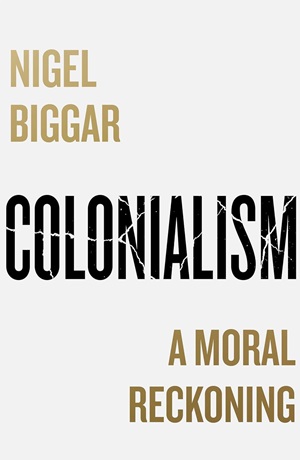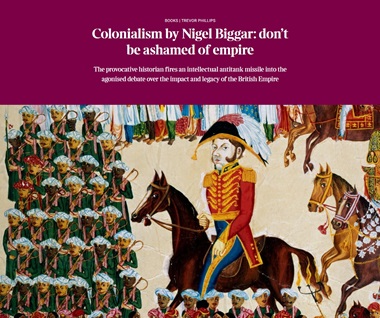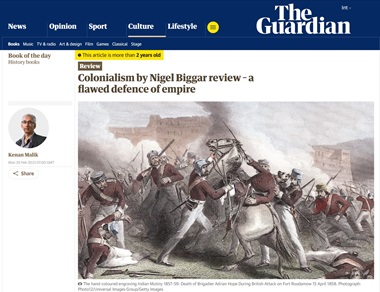
Nigel Biggar has been widely praised – and critiqued – for his insights on colonialism.
Nigel Biggar knows something about being critically received, but he was probably surprised when he learned that his alma mater had cancelled his lecture planned for March 6.
Biggar had been scheduled to deliver a talk on ‘Colonialism Revisited: Did the British Empire Promote Human Welfare?’ sponsored by Regent College’s Houston Centre.
Biggar, who received a Master of Christian Studies from Regent College in 1981, is Emeritus Regius Professor of Moral Theology at the University of Oxford and Distinguished Scholar in Residence at Pusey House, Oxford. He holds a BA in Modern History from Oxford and a PhD in Christian Theology & Ethics from the University of Chicago.
He is the author of several books, including Colonialism: A Moral Reckoning (William Collins, 2023), and was appointed C.B.E. (Commander of the Order of the British Empire) “for services to Higher Education” in the 2021 Queen’s Birthday Honours list.
Why not proceed?
Regent College President Jeffrey Greenman is not commenting publicly on the matter, but he did write a letter to Regent students February 14, stating:
In my judgment, the planned lecture on a very sensitive subject was not right for Regent since it needed different framing to foster constructive dialogue. Whenever we engage topics about which there is strong disagreement or controversy, it is critically important that all aspects of an event, from the choice of speaker to the event’s format, should demonstrate our concern for both critical reflection and appropriate pastoral awareness. . .
For the past 10 years I have sought to lead Regent to take very seriously our calling to love our neighbours on the traditional, ancestral and unceded territory of the Musqueam people. My concern was that this lecture would have been seen as out of sync with these efforts and could have seriously jeopardized our growing relationships with Indigenous elders and Indigenous Christian leaders locally and nationally.
A strong concern for me was to prevent this event from being interpreted as the College’s implicit endorsement of one particular interpretation of the troubling realities of residential schools.
 Colonialism has a world focus, but one chapter – Cultural Assimilation and ‘Genocide’ – does focus on residential schools in Canada.
Colonialism has a world focus, but one chapter – Cultural Assimilation and ‘Genocide’ – does focus on residential schools in Canada.
Biggar wrote, for example:
The wholesale damnation of the residential school system in Canada is overwrought and unfair. Notwithstanding their failings, and the suffering caused by them, the schools were founded on a belief in essential racial equality and consequent faith in the capacity of native people to learn, adapt and develop.
Greenman also stated:
I realize that there will be disagreement about the decision I have made, and some will be disappointed or upset by this change of plans. I regret that the decision was not made before the lecture was announced. Going forward, we will be making changes to our planning processes for events like these.
Be assured that this decision was made with careful consideration to important institutional commitments and relational concerns, and with a deep commitment to eagerly continue to pursue the College’s mission “to cultivate intelligent, vigorous and joyful commitment to Jesus Christ, his church and his world.
Mixed reception
Some alumni and students have, apparently, welcome the cancellation, having critiqued the event. Others, including some staff and others connected with Regent College, are unhappy with the decision.
The Catholic Register posted a February 19 article by Anna Farrow, which began:
A Vancouver theological college cancelled a March 6 public lecture by Oxford professor and member of the House of Lords Nigel Biggar after alumni took to social media accusing the speaker of being a residential school apologist and “mass graves denier.”
Also:
In a February 6 public Facebook post, a man identifying as a Regent alumnus wrote that the college “continues its slide down into toxic conservatism.”
Others lament the cancellation. Regent grad Brian Williams wrote to Jeff (Greenman), “to express my surprise and disappointment in Regent’s decision to cancel Nigel Biggar’s talk about the British empire and human welfare.”
He added:
As you know, Nigel is an ideal person for Regent to host. He and his wife, Ginny, are Regent alumni, he was one of Oxford’s Regius Professors, he is an Anglican priest, a member of the House of Lords, a widely published and respected author, and a deeply humble and charitable scholar and academic. (I think you and I first met when we sat together at the Seattle SCE session on his just war book.)
He must surely be one of our most accomplished alumni. In canceling his talk and the ensuing conversation with Prabo [Mihindukulasuriya], Regent missed an opportunity to celebrate one of its most celebrated alumni and missed an opportunity to model all the things Regent used to be and, I would think, still wants to be known for – a model of Christian charitable discourse the world and church dearly needs. . . .
It’s one thing for a handful of harsh online voices to rile each other up about someone they don’t know and have never read, it’s another thing altogether for a respected academic institution to provide implicit cover and support for those voices by hastily canceling the person they are busy unjustly denouncing.
I say “unjustly” because the reasoning that led Nigel to his various conclusions about Britain’s history are serious and strong, even if contestable, as are the questions he has raised, e.g., about claims of mass unmarked graves at some of Canada’s residential schools, which seems to be another flashpoint. However, it’s not hard to find numerous articles and independent reports raising the same questions given that very little forensic evidence has been discovered or at least released.
Of course, Nigel has no problem naming sin, evil and harm as such. His theologically motivated concern for justice runs deep and I think motivates much of his work. It is a concern to do justice to the truth and to justly defend anyone unjustly accused. Unfortunately, Regent students and faculty have now been deprived of the chance to engage with the person and his work. They would have been much the richer had they been able to do so, as I can personally attest.
Another critique (“The Biggar affair suggests that Regent is well down the path of canceling itself.”) is that of Douglas Farrow (husband of Anna Farrow, both Regent grads, both now Catholic), posted on First Things February 19.
Biggar himself has not hesitated to weigh in on the debate, re-posting some comments on his X page.
Critics and Colonialism
 Biggar has become a lightning rod for controversy since the publication of Colonialism in 2023.
Biggar has become a lightning rod for controversy since the publication of Colonialism in 2023.
The publisher, William Collins, made the case that “with Russia rattling its sabre on the borders of Europe and China rising to challenge the post-1945 world order, the liberal West faces major threats,” adding:
These threats are not only external. Especially in the Anglosphere, the ‘decolonisation’ movement corrodes the West’s self-confidence by retelling the history of European and American colonial dominance as a litany of racism, exploitation, and massively murderous violence.
Nigel Biggar tests this indictment, addressing the crucial questions in eight chapters: Was the British Empire driven primarily by greed and the lust to dominate? Should we speak of ‘colonialism and slavery’ in the same breath, as if they were identical? Was the Empire essentially racist? How far was it based on the theft of land? Did it involve genocide? Was it driven fundamentally by the motive of economic exploitation? Was undemocratic colonial government necessarily illegitimate? and, Was the Empire essentially violent, and its violence pervasively racist and terroristic?
Biggar makes clear that, like any other long-standing state, the British Empire involved elements of injustice, sometimes appalling. On occasions it was culpably incompetent and presided over moments of dreadful tragedy.
Nevertheless, from the early 1800s the Empire was committed to abolishing the slave trade in the name of a Christian conviction of the basic equality of all human beings. It ended endemic inter-tribal warfare, opened local economies to the opportunities of global trade, moderated the impact of inescapable modernisation, established the rule of law and liberal institutions such as a free press, and spent itself in defeating the murderously racist Nazi and Japanese empires in the Second World War.
As encyclopaedic in historical breadth as it is penetrating in analytical depth, Colonialism offers a moral inquest into the colonial past, forensically contesting damaging falsehoods and thereby helping to rejuvenate faith in the West’s future.
 Some have lauded his efforts. Publications such as The Times, The Telegraph and Literary Review published positive comments, and Stanford University professor (and prolific author) Niall Ferguson wrote:
Some have lauded his efforts. Publications such as The Times, The Telegraph and Literary Review published positive comments, and Stanford University professor (and prolific author) Niall Ferguson wrote:
Biggar fearlessly goes where few other scholars now venture to tread: to defend the British empire against its increasingly vitriolic detractors . . .
Those who wish to accuse the Victorians of genocide – who seek gulags in Kenya or Holocausts in the Raj – will probably not risk being ‘triggered’ by reading this book. But they really should . . .
Biggar’s book simply cannot be ignored by anyone who wishes to hold a view on the subject.
Others have reacted negatively. Writing in Church Times (an independent Anglican weekly published in the UK), for example, Peniel Rajkumar said:
Preposterously, Biggar selects a “moral lens” through which to offer a “moral” (re)view of colonialism – let the irony not be lost – in a way that mimics colonialism itself. Colonialism uses a time-tested tactic of seeking to redeem and reinforce itself by the constant reinvention of self-justifying moral and epistemological tools. . . .
Astutely weaponising prejudice, Biggar unveils his defence of colonialism in the consideration of eight questions . . .
An article in The Guardian by Kenan Malik describes Colonialism as “a flawed defence of empire,” stating:
Biggar’s real concern is not with the past but with the present. Denigrating colonialism, he claims, is an “important way of corroding faith in the west”.
Yet, in seeking to challenge what he regards as cartoonish views of imperial history, Biggar has produced something equally cartoonish, a politicised history that ill-serves his aim of defending “western values”. After all, to rewrite the past to suit the needs of the present, and to defend people’s rights only when politically convenient, is hardly to present those values in a flattering light.
Still coming to Canada
Despite the Regent College cancellation, Biggar will still be coming to Canada. He will be a featured guest at a meeting of the newly established Free Speech Union of Canada in Toronto, February 28. He is board chair of the Free Speech Union, which is based in London.
And he is still expected to be out in Vancouver in early March (FSU Canada will be hosting a members only event March 7). It appears that the Regent College board will be meeting soon to discuss the matter, so it is possible that we have not yet heard the end of this story.

When Christianity shies away from confronting difficult truths, it risks losing its credibility and relevance. Fear of offense should not prevent honest discussions that are essential for faith and understanding.
You might think that a theology college would be interested in the truth rather than a “correct framing” of an issue, given that Christ was a truth teller and not a PR person. But these are the times we live in
We were all born into a fallen culture, a humbling thought so central to our faith and yet so often forgotten amidst the faithful’s actions and fervour to evangelize. Now that colonialism and capitalism had morphed into the omnipresent globalization, the world’s moral boundary has been blurred further.
With the East and the West each claiming the moral high ground, it is alarming to note how similar arguments used by local Chinese media to white-wash China’s horrible records were used by Biggar and [publisher William] Collins.
If theology still matters in our deeply polarized world, Regent College should follow this up with a robust and candid recount of colonialism, the role of the church, the fallout to the Indigenous people in Canada, UN’s leadership at decolonization and a call to true reconciliation.
When I attended Regent in the 70s and was subsequently a member of the Academic Senate and Board, they never would have dreamed of pulling a stunt like this. To do so would have been considered a prime example of intellectual dishonesty and moral cowardice. The faculty taught and demonstrated that the Truth could not only withstand informed scrutiny, but welcomed it. This action on their part disgraces the institution and defames the one they claim to serve.
Nicely balanced coverage. Well-written and pulls in many differing points of view, hinting that there is more to come — which is while the issue is timely, as opposed to just joining in the mob around a controversy.
You’ve added more context which is what is sorely lacking in our social media-inflamed world.
I wonder what James Houston would think of his cancelation. What a lost opportunity to find out the truth of such matters, beyond sound bites and ideological spin.
Jim would have been appalled.
He’s still alive but not involved with the day to day running of the college anymore.
I’d love to hear him speak. These issues can be explored in a respectful atmosphere, surely? Imperialism and empire surely is a timely topic! It is in the minds of many right now.
The talk has been rescheduled! Christ Covenant Church in Langley, BC is hosting him on Tuesday, March 4 at 7 pm. It’s free but registration is encouraged:
I think it cowardly of Regent to cancel his appearance. It’s clear the ones who called for it haven’t read his book, nor have any interest in thinking seriously about this complex issue. It’s much easier to see colonialism through a manichean lens – much easier to virtue signal.